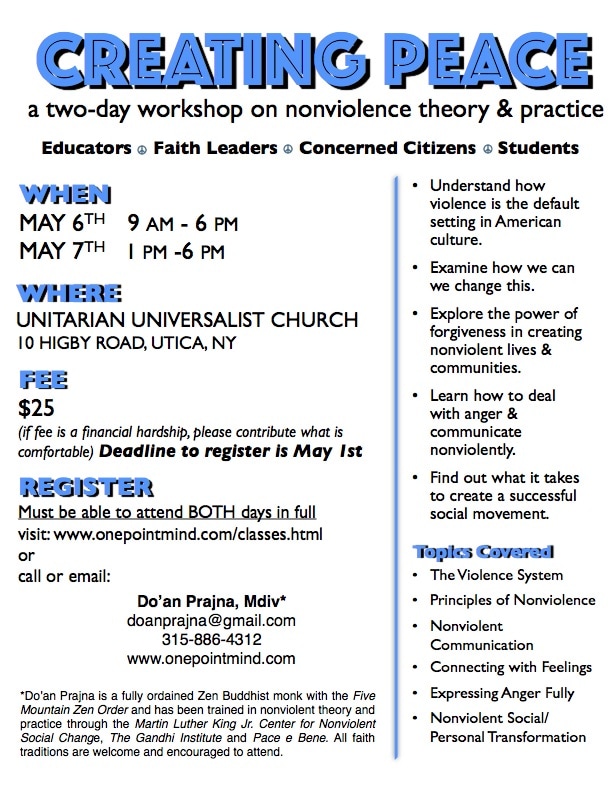One Point Mind
|
Naming and owning our feelings—our emotional responses to what is happening around us—is key to experiencing natural joy. However, many of us do not know how to recognize the feelings we are experiencing, let alone, how to stay with them. There are three main challenges that we face when learning how to own our own feelings:
The first challenge: allow ourselves to acknowledge the existence of our feelings.
1 Comment
For many, death is an uncomfortable topic. While we many not share beliefs regarding what happens after the body dies, we can all agree on two things:
1. We will all experience death of the body. 2. We don't know when death will happen. Because of these two facts, many of us spend a lot of energy trying to deny or avoid accepting them. Now we could spend a lot of time and energy contemplating the unknown, of what happens after the body dies. But in the end, all we are left with are ideas and beliefs. Instead, we could decide to make the most of the life we know we have. Ridding ourselves of the fear of death becomes a crucial step in connecting to our natural joy. That is because the fear of death underlies many of the other fears we may have: the fear of aging, the fear of losing identity, the fear of losing power, the fear of losing possessions, etc. Rather than fearing the death of the body, some future event, we can allow ourselves to be comfortable with that truth and let go of many other fears. We can refocus our attention on what is here, right now, right before us and celebrate in the beauty and wonderment of the leaves dancing in the wind, the birds singing in the trees, the friend that sits beside you. When Death Comes by Mary Oliver When death comes like the hungry bear in autumn; when death comes and takes all the bright coins from his purse to buy me, and snaps the purse shut; when death comes like the measle-pox when death comes like an iceberg between the shoulder blades, I want to step through the door full of curiosity, wondering: what is it going to be like, that cottage of darkness? And therefore I look upon everything as a brotherhood and a sisterhood, and I look upon time as no more than an idea, and I consider eternity as another possibility, and I think of each life as a flower, as common as a field daisy, and as singular, and each name a comfortable music in the mouth, tending, as all music does, toward silence, and each body a lion of courage, and something precious to the earth. When it's over, I want to say all my life I was a bride married to amazement. I was the bridegroom, taking the world into my arms. When it's over, I don't want to wonder if I have made of my life something particular, and real. I don't want to find myself sighing and frightened, or full of argument. I don't want to end up simply having visited this world 1. Paying attention is the key. Notice where there is resistance and breathe.
2. Observe the use of such words as "should", "can't","but" or "ought to". These words are red flags for resistance and holding on. Change "I should" to I choose to". Change "I can't" to "I choose not to". 3. In relation to resistance, ask yourself: "What would it be like if I just allowed this to be as it is without resisting it?" 4. Ask yourself, "Does it really matter?" Often it really doesn't. However, if it does really matter, focus on dealing with it with compassion. 5. Just simply let it go. 6. Move away from complaining to creating. Complaining keeps us stuck, creativity shifts us into higher brain function that allows us access to collaboration, problem solving, compassion and wisdom. 7. Practice forgiveness. If you are being judgmental of yourself, stop being so judging. If you are holding back forgiveness from someone else, forgive the person and free yourself to move on.  It was the coldest winter ever--so cold that many animals froze to death. In an effort to save themselves from this icy fate, the porcupines decided to gather together to fend off the chill. They huddled close to each other--covered and protected from the elements--and were warmed by their collective body heat. But their prickly quills proved to be a bit of a problem in close proximity--they poked and stabbed each other, wounding their closest companions. The warmth was wonderful, but the mutual needling became increasingly uncomfortable. Eventually, they began to distance themselves one from the other, scattering throughout the forest only to end up alone and freezing cold. Many died. It soon became clear that they would have to choose between solitary deaths in the frigid wilderness and the discomfort of being needled by their companions’ quills when they banded together. Wisely, they decided to return to the huddle. They learned to live with the little wounds caused by the close relationship with their fellows, in order to benefit from the collective heat they generated as a group. In this way they were able to survive. Possible morals of the story:
The following is the true story of Mary Johnson and Oshea Isreal:
Oshea was 16 years old and wanted to get into a gang. The way that he proved himself to enter the gang was to shoot somebody—it was an initiation rite. He shot this kid, Laramiun, he didn’t know. Two days later, he was apprehended, brought to trial, and at the end of the trial, convicted. Just before he is taken away in handcuffs, the mother of the boy who was shot, Mary Johnson, stands up, looks him in the eye, and says, “I’m going to kill you,” and then sits down. After being in prison for a year or so, the Oshea is visited by Mary, and he’s kind of frightened. She says, “I’ve just got to talk with you.” They have a little bit of conversation, and as she leaves him she says, “Do you need anything? Cigarettes?” and leaves him a little money. She starts to visit him. She goes every few months, and over the course of three or four years, she starts visiting him more regularly, talking to him. When he was about to get out at the age of 17, she asks, “What are you going to do?” and he says, “I have no idea. I got no family, no nothing.” And she says, “Well I’ve got a friend who has a little factory—maybe I can help you get a job.” So she arranges that with the parole officer. Then she asks, “Where are you going to stay?” and he says, “I don’t know where I’m going to go.” And she says, “Well I have a spare room where you can stay with me.” So he comes and stays in the spare room, takes this job, and after about six months, she says, “I really need to talk with you—come into the living room. Sit down, let’s talk.” She looks at him and says, “Remember that day in court when you were convicted of murdering my son for no reason at all, to get into your gang, and I stood up and said, ‘I’m going to kill you?’” “Yes ma’am, I’ll never forget that day,” he says. And she looks back and says, “Well, I have. You see, I didn’t want a boy who could kill in cold blood like that to continue to exist in this world. So I set about visiting you, bringing you presents, bringing you things, and taking care of you. And now I let you come into my house and got you a job and a place to live because I don’t have anybody anymore. My son is gone and he was the only person that I was living with. I set about changing you, and you’re not that same person anymore. But I don’t have anybody, and I want to know if you’d stay here. I’m in need of a son, and I want to know if I can adopt you.” And he said yes and she did. Today, Oshea and Mary are next door neighbors. They speak all over the country about the power of forgiveness. Now that a new American president has been elected, we need to acknowledge that there will be a large number of people that will be disappointed, fearful and even angry. This is not the time to give up and fall into doom and gloom ruminations. This is also not the time to rest or even to celebrate. Many people are suffering greatly with no idea how to heal themselves. There remains a great division in our country that needs attention. We cannot continue to be a United States comprised of a divided people. Such a dynamic is unsustainable--no matter which person you may have wanted to be elected.
Our work is cut out for us: We must to do better as citizens. We must to learn how to slow down and pay attention. We must listen deeply to those we don’t agree with and come to understand the source of fear and anger. We must relearn how to gather facts properly. We must demand integrity, transparency and balance from the media, from our political leaders, businesses and organizations. True consensus comes from sitting down and listening to each other and working very hard to address everyone's needs and concerns--it can’t be done by force. We must to stop being lazy and complacent about what is happening around us. We can no longer defer responsibility to others with the hopes that someone else will take care of everything. We must take responsibility for our own lives and for the conditions that we find ourselves in. It’s time to pull back our sleeves and get our hands dirty. It's no longer acceptable to remain ignorant, oblivious or apathetic. Remember that it was our fear, anger, ignorance and apathy that gave rise to the candidates we had to choose from. We did this to ourselves. If you don’t like where we are, do something about it. Don’t just complain or give in. The first step is to address the fears, anxieties and anger that resides within ourselves. Understand yourself, know where you are right this moment: ask what you see, smell, taste, touch and feel--right this moment. If we don't know where we are and who we are in this very moment, we can't possibly understand the world around us. Then, take a breath, greet the sun, and get to work! I love you all. Yes, ALL of you! |
One realm we have never conquered--the pure present. One great mystery of time is terra incognita to us--the instant. The most superb mystery we have hardly recognized--the immediate, instant self.
~ D.H.Lawrence AuthorI am Myohye Do'an, a bhikṣu (fully ordained Chán Buddhist monk) and Chán Master. Here I share my thoughts and observations about living a life of compassion, attention and gratitude. Archives
August 2021
Categories |

 RSS Feed
RSS Feed